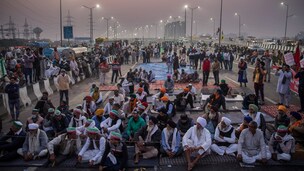The laws add to already existing resentment from farmers, who often complain of being ignored by the government in their push for better crop prices, additional loan waivers and irrigation systems to guarantee water during dry spells. (Image: AP)
The farmer agitation in New Delhi might be one of the largest and longest protests in recent memory. But as they enter in the 26th day, they do not have the same groundswell of support like say an India Against Corruption movement saw a decade ago, shows a survey.
The survey by News18 on the Centre's three farm reforms shows that majority of citizens polled support the proposed laws and believe that the protests should end. At least 7 in 10 people surveyed expressed support for reform and modernization in agriculture.
This support was quite broad-based and it is not surprising. The 70th round of NSSO on Key Indicators of Agricultural Households in India shows that only six per cent of farmers gain from MSPs. The rest put up with vagaries of the occupation and imperfect markets. For produce like poultry and dairy, a MSP or Mandi system doesn’t exist and they have grown faster than food grains.
Farmers from Punjab and Haryana have been leading the protest since they are the ones most dependent on the existing system and minimum support prices (MSP).
As we have shown in this data story, for certain crops such as wheat, these two states account for almost half the nationwide procurement under MSP. In Punjab, 56 percent of respondents supported the farm laws while the number was as high as 80 percent in Haryana.
The reforms turn the entire country into a single market for agriculture produce. They allow farmers to sell their produce anywhere in the country and outside the APMC-operated Mandis. Opening up this market will encourage competition, which will make the agriculture sector more efficient, bring in investments and benefit the farmers.
It is only common sense that with more options to choose from farmers will stand to benefit by getting higher prices. Sales to a corporate or trading entity will enable farmers to hedge against price fluctuations. As many as 69 out of every 100 persons polled in the News18 survey believed that farmers can get a better price for their produce because of wider choice enabled by the new laws. If anything, this number was higher in Haryana (80 percent) and Punjab (76 percent).
The continuing protests in face of appeals from the government has given rise to the perception that they are politically motivated. Close to half the respondents in the survey believed as much. Remember that these reforms have been on the plate of most political parties for a long time. In the 2019 general elections, for example, the Congress manifesto said that the party will repeal the APMC Act and free agriculture and its exports from all restrictions.
The feeling of vested interests hijacking the protests is also reinforced because the government has tried to meet the farmers halfway. While not rolling back the reforms and rightly so, the Prime Minster has assured farmers that the existing MSP system for crops such as rice, wheat and other agri-commodities will continue.
The laws present a path for Indian agriculture to meet the demands of modern times which includes challenges like climate change and water scarcity. The existing system of agriculture production and marketing has aggravated some of these challenges. It is high time the farmers end the protest and reach a compromise. They can ask the government for help with the transition but a repeal of all the new laws is an unreasonable demand.
That is a widespread sentiment. About 52 percent of respondents believe that a repeal is uncalled for and 57 percent said it is time to end the protests.










_2020091018165303jzv.jpg)


























